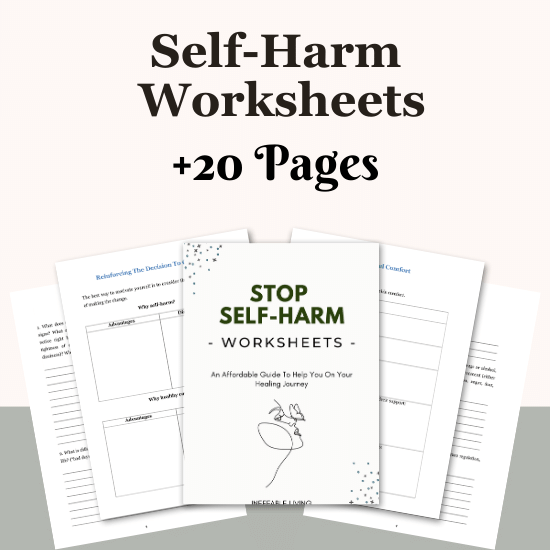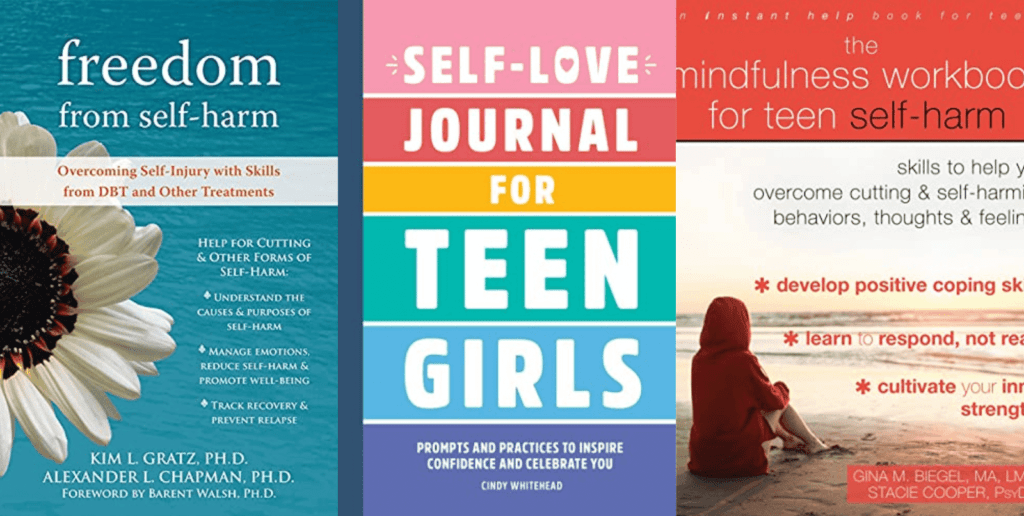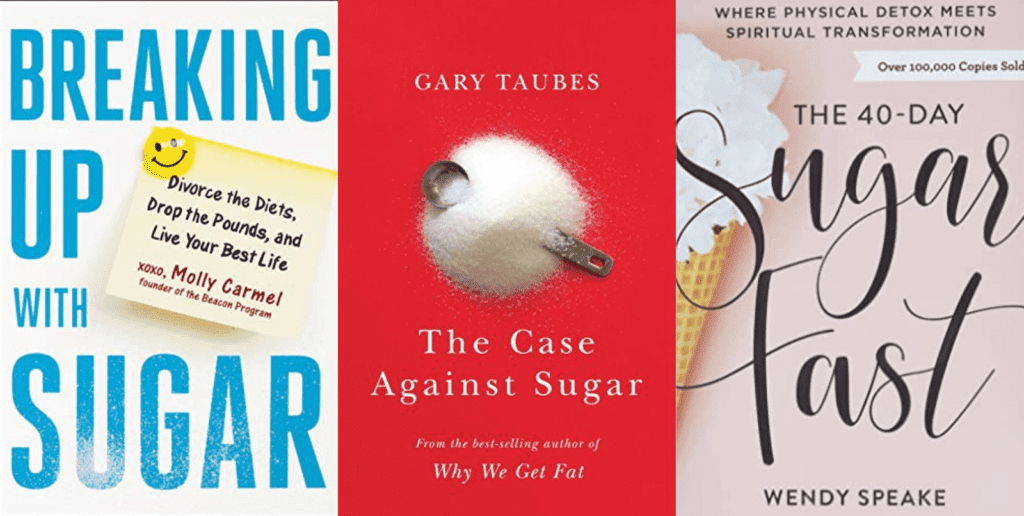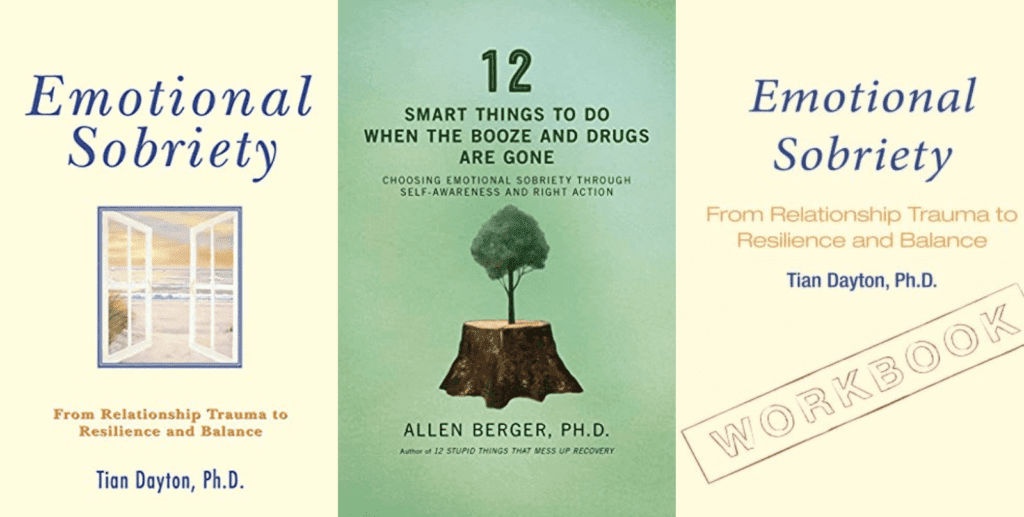This post contains some of the best books about self harm.
Disclosure: Some of the links below are affiliate links. This means that, at zero cost to you, I will earn an affiliate commission if you click through the link and finalize a purchase.
What Is Self Harm?
Self-harm, also known as self-injury, is a behavior that involves intentionally inflicting harm on oneself.
It is typically done as a non-suicidal act and is often used as a coping mechanism to deal with emotional pain or distress.
Self-harm can take many forms, including cutting, burning, scratching, hitting, or hitting objects.
It is important to note that self-harm is not a healthy or effective way of dealing with emotions and should be taken seriously.
If you or someone you know is engaging in self-harming behaviors, it is crucial to seek help from a mental health professional or a trusted person in your life.
Best 10 Books About Self Harm

1. Freedom from Selfharm
By Kim Gratz, Alexander Chapman
This complete guide to stopping self-injury gives you the facts about self-harm, corrects common myths about this behavior, and provides self-soothing techniques you can begin using right away for regulating difficult or overwhelming emotions.
Related: Self Harm Addiction Quiz

2. The DBT Skills Workbook for Teen Self-Harm
By Sheri Van Dijk MSW
This workbook will guide you through four essential DBT skills:
- Mindfulness shows you how to experience emotion without having to act on it
- Distress tolerance teaches you how to deal with the urge to self-harm
- Emotional regulation allows you to understand and control painful feelings
- Interpersonal effectiveness helps you build self-respect and minimize feelings of worthlessness and hopelessness
Related: Addiction To Self Harm: Top 5 Steps To Overcome It

3. Treating Suicidal Clients & Self-Harm Behaviors
By Dr. Meagan N Houston
This complete resource is filled with proven assessments, unique worksheets and action-based methods to help your clients navigate and survive the turbulent periods of their lives where suicidal and/or self-harm behaviors appear to be their primary options to cope.
Related: How To Cope With A Self-Harm Relapse? Top 5 Steps

4. The Mindfulness Workbook for Teen Self-Harm
By Gina M. Biegel MA LMFT, Stacie Cooper PsyD
In this workbook, you’ll learn about the power of mindfulness, and how it can help you create your own special space for simply being with your thoughts. When you’re dealing with difficult emotions, you’ll have this safe space to go to again and again—no matter where you are or what you’re doing. You’ll learn how to be mindful of your senses, techniques for managing difficult feelings before they escalate, and move past self-judgment to embrace self-compassion and self-awareness.
Related: Why Is Trauma Therapy So Hard? (+Best Trauma Healing Exercises To Support Your Recovery)

5. Cutting: Understanding and Overcoming Self-Mutilation
By Steven Levenkron
Using copious examples from his practice, Steven Levenkron traces the factors that predispose a personality to self-mutilation: genetics, family experience, childhood trauma, and parental behavior. Written for sufferers, parents, friends, and therapists, Cutting explains why the disorder manifests in self-harming behaviors and describes how patients can be helped.
Related: Undermothered: How to Mother Yourself Using These Practical 10 Strategies?

6. Understanding and Responding to Self-Harm
By Allan House
Showing the various forms self-harm can take, this book explores the reasons behind it, and offers advice on self-management, support to others, and what services are available. Full of clear, thoughtful advice for those who may be thinking of harming themselves, or have already done so, as well as guidance for families and friends on helpful strategies and responses – and ones to avoid – it uses evidence from research and direct experience to provide an essential resource.
Related: Borderline Personality Disorder Support Group

7. Treating Self-Injury: A Practical Guide
By Barent W. Walsh
This trusted practitioner resource is acclaimed for its clear, compassionate, and hopeful approach to working with clients who self-injure. Barent Walsh provides current, evidence-based knowledge about the variety and causes of self-injurious behavior, its relationship to suicidality, and how to assess and treat it effectively. Illustrated with detailed case examples, chapters review a wide range of cognitive-behavioral interventions.
Related: Top 7 Skills For Coping With BPD [+ BPD FREE Resources]

8. The Parent’s Guide to Self-Harm
By Jane Smith
This book provides the answers you need to questions such as:
– How do I know for sure whether my child is self-harming?
– How should I approach my child?
– What help and treatment is available to us?
– What can I do to help my child?
– How have other parents coped?
Related: Emotional Permanence (What Is It & Top 4 Tips On How To Cope With Emotional Permanence Deficit?)

9. Self-Love Journal for Teen Girls
By Cindy Whitehead
This journal for girls includes:
- 4 areas of self-love—Support teen girls in every aspect of life with affirmations and prompts divided into four key pillars of self-love: self-awareness, self-worth, self-respect, and self-care.
- Creative activities—Girls will put what they learn into practice through thought-provoking exercises like writing a love letter to themselves, creating a gratitude jar, and drawing the things that make them happy.
- Uplifting quotes—Words of wisdom from strong female role models are sprinkled throughout the book to offer teen girls even more guidance for their self-love journey.
Related: Inner Teenager Healing: 14 Proven Exercises to Heal Your Inner Teenager

10. Self-Love Workbook for Women
By Megan Logan MSW LCSW
What sets this self-care journal and workbook apart from other self-love workbooks for women:
- Proven techniques—Fall in love with yourself using a variety of compassionate exercises rooted in mindfulness and positive psychology.
- Inspiring prompts and motivating activities—Explore all that you are with quizzes and journaling exercises that will help you tap into your emotions and let go of limiting beliefs. Includes writing space for reflection and introspection.
- Empowering affirmations—Boost your positivity and nurture yourself using the uplifting affirmations interspersed throughout the book.

How Books About Self Harm Can Help
Books about self-harm can be helpful in several ways:
1. Education and Awareness: Many books on self-harm provide valuable information about the causes, signs, and effects of self-harming behaviors. They help raise awareness about this issue, dispel misconceptions, and promote understanding.
2. Empathy and Validation: Reading about characters or real-life stories that depict individuals who self-harm can help those who are struggling feel less alone. It can validate their experiences and emotions, providing a sense of empathy and connection.
3. Coping Strategies: Books often offer practical tips and coping mechanisms for managing self-destructive behaviors. They may suggest healthier alternatives, such as journaling, art therapy, or seeking professional help, which can encourage readers to explore alternative ways of dealing with their pain.
4. Emotional Support: Books that delve into the emotional turmoil experienced by self-harmers can provide emotional support. By offering relatable narratives and internal monologues, these books can help readers process their own feelings, making them feel understood and supported.
5. Inspiration for Recovery: Many books about self-harm focus on recovery journeys, emphasizing the possibility of healing and growth. These narratives can inspire readers to seek help, develop positive coping mechanisms, and work towards self-improvement.
Conclusion
While books can be helpful, they are not a substitute for professional help. If you or someone you know is struggling with self-harm, it is important to reach out to a mental health professional for guidance and support.



